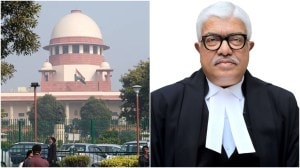An ultimatum and soured ties
Karzais demand that Americans cede control of a key prison has exposed the mutual suspicion that runs deep in US-Afghan relationship
MATTHEW ROSENBERG
President Hamid Karzais denunciation last week of abuses at the main American prison in Afghanistanand his abrupt demand that Americans cede control of the site within a monthsurprised many. The prison,at Bagram Air Base,is one of the few in the country where Afghan and Western rights advocates say that conditions are relatively humane.
American officials scrambled to figure out the source of the allegations. Now they have part of an answer: the Afghan commission that documented the abuses appears to have focused mainly on the side of the prison run by Afghan authorities,not the American-run part. Karzai was,in essence,demanding that the Americans cede control of a prison to Afghan authorities to stop abuses being committed by Afghan authorities.
But the American snickering subsided when it became apparent that the Afghans were not backing off their demand,American officials said. We have the right to rule on our own soil, said Gul Rahman Qazi,the chief of the Afghan commission that investigated the prison.
The matter is exposing the deep vein of mutual mistrust and suspicion that runs in the American and Afghan relationship,and officials characterise the prison dispute as a critical complication for the US,intent on withdrawing from the Afghan war on its own terms.
The prison houses almost all the detainees that forces from the American-led coalition deem high value, including Taliban operatives. Transferring the prison to Afghan control is a central issue in the negotiations over the shape of the relationship between the two countries after NATO ends combat operations in 2014.
It is the latest case of how increasingly frequent and unilateral outbursts by Karzai and his allies indicate growing resentment of the Americans. Afghan and Western officials describe Karzai as increasingly suspicious about being cut out and worked around by the Americans. Anti-Western advisers have been gaining in influence in his circle,the officials said.
Karzai is again demanding an immediate end to the night commando raids that the US considers vital to getting at insurgent field commanders. Another presidential commission late last month publicly condemned NATO forces for killing civilians without mentioning that the Taliban killed far more innocents.
Karzai came close last month to disrupting the latest American move to jump-start talks with the Taliban when he rejected a plan for Qatar to host an insurgent negotiating office. He has since acquiesced,but his aides say the overtures to the Taliban are another example of the Americans trying to sidestep Karzais administration.
Then came last weeks demand for control over the American prison,known as the Parwan Detention Facility. American officials planned to meet with the Afghans to discuss the matter last Saturday,waiting to see whether Afghan officials changed their tone. They did not. Qazi,the chief of the Afghan commission,said Afghan officials considered transfer of the prison a critical matter of national sovereignty.
The commissioner said prisoners had complained of torture,humiliating strip searches,being held in freezing cells and a lack of due process. Qazi acknowledged that we do not have a lot of information on the details of what had taken place in the American side of the prison.
Afterward,the commissions deputy chief,Abdul Qader Adalatkhah,said that most of the abuses documented so far were from the Afghan side of the prison.
Built as part of the Obama administrations revamping of American detention facilities and policies,the $60 million prison abuts Bagram Air Base,one of the main coalition bases in the country.
It is unclear how the Afghan officials will proceed in pressing their authority to take control of the prison. The Americans have been slowly training Afghan guards and administrators. Faizi,the presidential spokesman,brushed aside concerns about Afghan readiness. He said the government was only sticking to an agreed upon plan to hand over the prison by the end of 2011.
An internal Afghan government document about the prison in 2010,obtained by The New York Times says the handover is undecided. The transition will be based on demonstration of capacity rather than a specific time table, the document reads.
American officials said they believed the prisons fate would ultimately be decided in the talks on the so-called strategic partnership document,which is intended to spell out the relationship between Afghanistan and the United States after 2014. The next round of talks has not yet been scheduled.



- 01
- 02
- 03
- 04
- 05




























